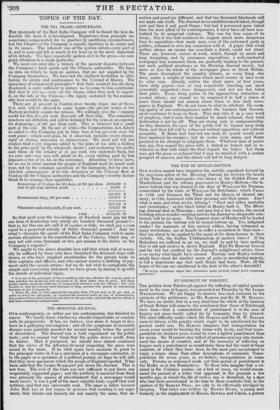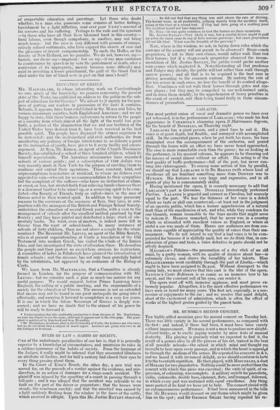PUNISHMENT OF FORGERY.
THE petition from Edinburgh against the inflicting of capital punish-. ment in the case of forgery, was presented on Thursday by Sir JAMES MACKINTOSH. We are happy to observe two such converts to the opinions of the petitioners, as Mr. BARING and Sir M. W. RIDLEY. We have no doubt, that in a very short time the whole of the bankers of Great Britain will come to the conclusion that those of Edinburgh have done—that a commutation of punishment is in the case of forgery not more loudly called for by humanity than by interest. The chief difficulty under which Mr. BARING and Sir M. W. RIDLEY seem to labour, is the penalty which ought to be substituted for the present awful one. Mr. BARING imagines that transportation for seven years would be treating the crime with levity, and that trans- portation for fourteen years would be even a lighter punishment than for seven. Sir MATHEW also talked of persons carrying into banish- ment the means of comfort, and of the necessity of inflicting on forgers such a punishment as would make them feel the want of those comforts of which they have been for the most part accustomed to enjoy a larger share than other descriptions of criminals. Trans- portation for seven years, is, we believe, transportation in name only. Persons so sentenced work out their period of punishment in the Hulks or in the Penitentiary. To those who imagine that a cri- minal in the Colonies reclines on a bed of roses, we would recom- mend the perusal of a letter that appeared in the journals a few months ago, in which the life of such a one is described, by a man who had been accustomed in his time to those comforts that, in the opinion of Sir ROBERT PEEL, are only to be effectually abridged by hanging. That letter was written by HENRY DUNN, a young man formerly in the employment of Messrs. SEWELL and Caoss, a person of respectable education and parentage. Let those who doubt whether, to a man who possesses some remains of better feelings, banishment be a light infliction, read over poor DUNN'S account of his sorrows and his suffering. Perhaps to the rude and the ignorant —to those who have all their lives laboured hard in this country— hard labour, even though compulsory, in another, may not bring much terror : but the case is very different with persons of compa- ratively refined sentiments, who have enjoyed the sweets of ease and the pleasures of decent companionship. To such, the Hulks, or the forests of New Holland, are no paradise. We do not, however, say— banish, nor do we say—imprison : but we say—if any man continues to countenance by speech or by vote the punishment of death, after a confession of, its impropriety, merely because some difficulty may exist in inventing a lesser punishment, the guilt of the blood that is shed under the law of blood rests in part on that man's head !



















 Previous page
Previous page